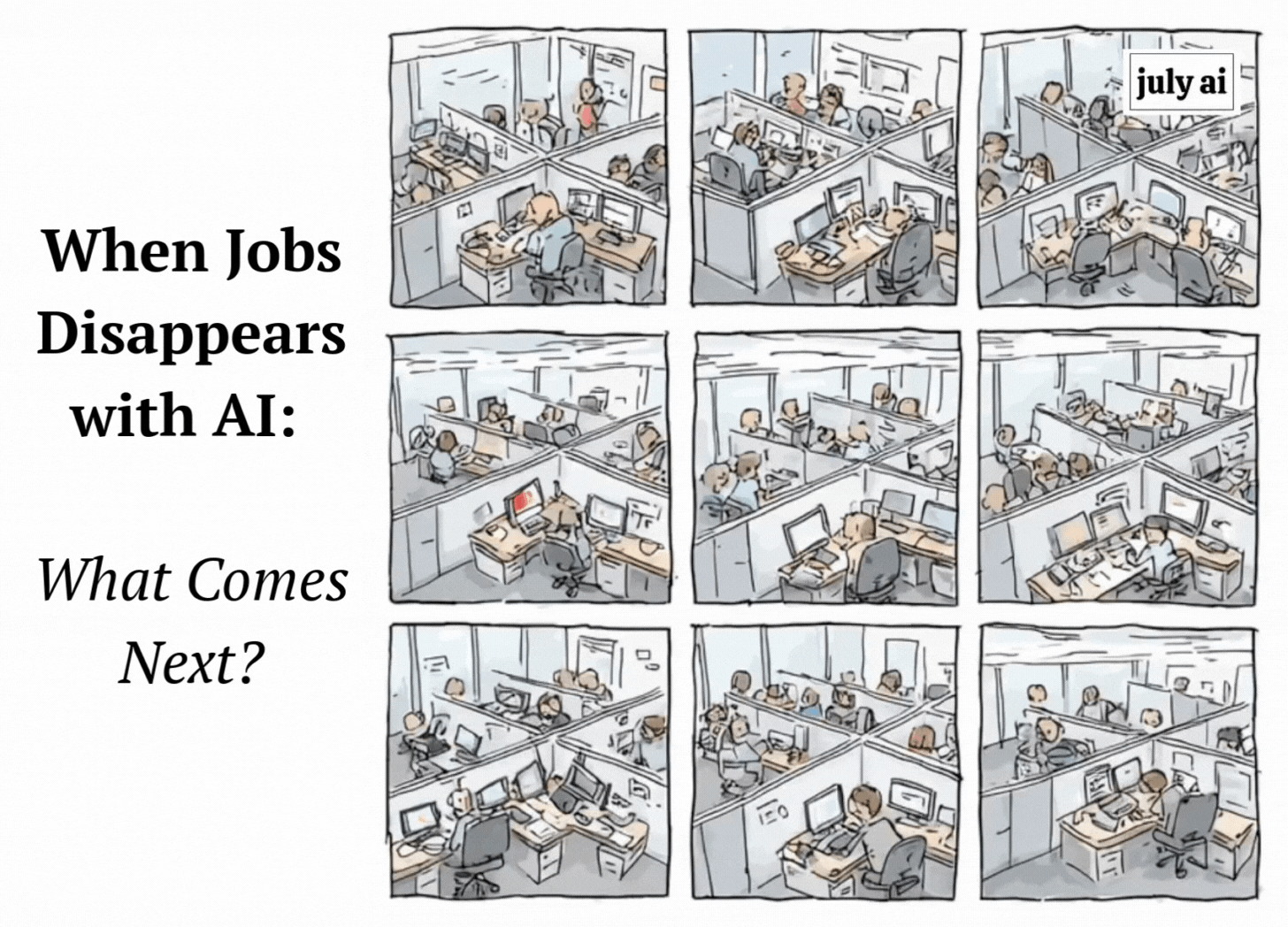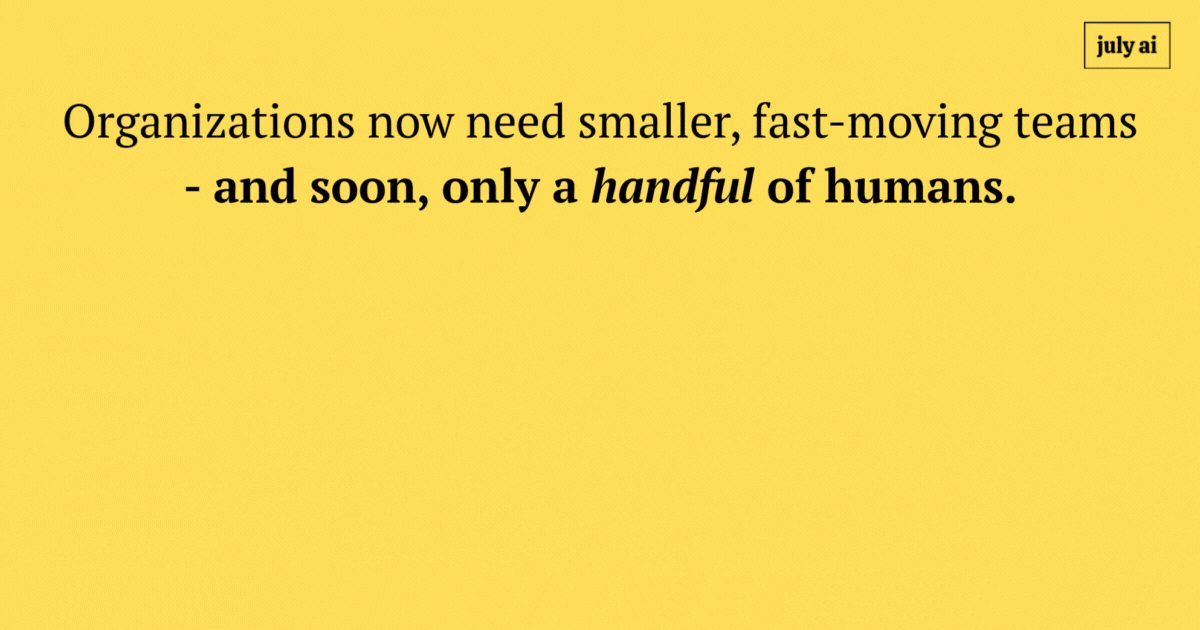When Jobs Disappear: What Comes Next?
Why we’re optimistic - and how we’re preparing.
Why I’m Still an Optimist
I moved from South Korea to the US at 26 to attend business school at Wharton. My first classes were overwhelming - not just because of the language, but because of the culture. People spoke confidently, voices overlapping in a kind of controlled chaos. No one was "moderating" the discussion, and if you didn't assert yourself, you were invisible, or at times walked all over. In my home culture, this would have come across as “over” confident, even rude. But in that setting, it was simply the norm. I later realized that ideas were built through this process, guided by an unspoken etiquette.
That experience marked the start of a decade-long journey: adapting to a foreign environment, teaching myself how to navigate a new system, and slowly building a career in business. I went through cycles of adjustment: some empowerment, some overcorrections, and continuous rebalancing. There were countless times when I was reminded of how scarce it is to see business leaders with foreign nationals in the United States. But each time, I (painfully) told myself that so long as I build towards the right fundamentals, all I need to do to adapt is to keep going. The bottom line that I’ve learned through this is that motivated people are incredibly adaptable because almost anything can be learned. With AI shaping the workforce, now I am asking: “how do we make this adaptation easier”.
Lessons About Building a Marketplace
Earlier in my career, I helped build a complex operational network to launch DoorDash’s grocery business during the COVID-19 pandemic. This meant building a fully remote human network to handle grocery orders, even without prior experience, and ensuring customers consistently received what they needed.
The experience revealed an essential insight for me: finding motivated people is only half the battle. The other half is empowering them to contribute, then aligning their good work with the right-sized rewards, monetary or non-monetary. When that happens, people thrive - and service quality naturally follows.
In any marketplace business, contributors are the true backbone. The magic happens when we put these people first - a principle too often overlooked in complex marketplaces. This takeaway is shaping how we think about the future of work at July AI. Traditional job structures may evolve or even disappear, but the need for meaningful work and fair compensation will remain. We will share the early results of our work in the coming weeks, so stay tuned.
Opportunities in a Changing World
As technology and AI accelerate change, new ways to contribute and create value are emerging. Work is becoming more versatile, decentralized, and outcome-focused. As we are thinking about this problem space, we’d be thrilled to share some observations. A few patterns stand out:
Build on your foundation. As AI augments one’s capacity, work will increasingly shift toward true 10x value creators. We envision an AI-augmented future-of-work - where decision-makers and exceptional contributors, like Greg Brockman coding end-to-end on his own, become the norm. The flip side is that the traditional ‘job unit’ may disappear, simply because the org becomes lighter and leaner. That’s why now is the moment to define your core, understand your superpower with clarity, and double down on it.
Versatility matters. Functional boundaries are collapsing. Designers prototype through vibe-coding, analysts build tools, creative writers automate processes - the skills you bring can now apply across multiple contexts, and this multi-functionality is already expected in some functions.
Ship and iterate a lot faster. More functional capabilities mean reduced cross-functional dependencies in organizations where smaller teams can prototype, test, and ship quickly with the help of AI. Speed and adaptability are now key advantages. Some orgs already started to expect x2-5 velocity of operating and started to mirror that in performance management.
Asynchronous work is the new norm. Because it’s so easy to visualize your idea, decisions, feedback, and iteration can happen without meetings but by simply sharing a working prototype. Your judgment, original idea, and intuition matter more than ever.
At the core of all of this is the principle that people, not just processes, create value. The ability to contribute meaningfully, adapt, and be rewarded is becoming more important than ever.
The Future of Work Is Still Being Written
We don’t fully know the scope of what AI can automate. Some estimates suggest 50-70% of today’s work is automatable. Others say “all remote” work that doesn’t require a physical presence is at risk. And, combined with quantum computing, some futurists even imagine a world with near-zero human labor, simply because humans can’t compete. We’re already seeing agentic tools take over full functional workflows (e.g., agent as your CFO).
Some believe Universal Base Income will solve this shift (everyone’s economically safe and work is no longer needed). However, people’s aspiration and ambition is not universal. People will still seek meaning, purpose, and progress. Communism failed because it ignored that. What will we say to our kids if they actually want to do more? The future needs a new approach to enable access to economic opportunities.
If You’re in the Workforce Today, Here’s What You Can Do Now:
Find the areas where your expertise or unique specialty truly lies - and make sure you extract meaningful value from them. For example, focus on owning assets that appreciate, holding shares, or securing copyrights so your contributions compound over time. Prioritize projects where you can make a real impact and where your skills are both recognized and rewarded. Seek opportunities that allow you to leverage what you do best while creating lasting, meaningful returns.
Looking Ahead
We’re exploring ways to make this vision tangible, connecting people with opportunities where their contributions are valued, recognized, compensated, and compounds. In particular, we will introduce ways for people to accrue value over time by utilizing their skills and contributions - more to come.
If this resonates, join the waitlist for July AI and we’ll notify you as soon as the product becomes public!
This article was informed by candid, off-the-record conversations with industry peers navigating these changes firsthand.
References
: McKinsey Global Institute – Generative AI and the future of work in America
: Situational Awareness Institute – Report (June 2024)
: Future of Work with AI Agents: Auditing Automation and Augmentation Potential across the U.S. Workforce (Stanford University, June 2025)


